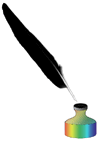It's getting dark riding home from work these days. I won't even try after the end of daylight savings time, so it's just whatever I can do this week and next.
The city seems to be finished with our sidewalk construction. They filled in topsoil in the berm (between the sidewalk and the curb), sprinkled some grass seed on it, and put blacktop along the curb and in the spaces next to our driveway apron. We're all ready for snow, and a good thing, because we could have some any day (but probably won't for a month).
After supper I filled the Forester up with gas, returned some library books, and still got to klezmer class on time. Let's see -- the books I returned were Disruption, about advertising, didn't read it; Thirty Seconds by Michael Arlen, about the making of a TV commercial, started it but didn't get very far; Why the Earth Quakes<, mistitled -- it has more about how buildings are made to be earthquake resistant than about what causes earthquakes -- but interesting enough that I finished it; and Volcanoes, Crucibles of Change by Richard Fisher et al. It's what I'm reading, after having read his Out of the Crater, and I renewed it.
We had eleven (count em! three flutes, two clarinets, alto sax, bass trombone, cello, accordian, electric bass, and me on trumpet and baritone horn) people at klezmer tonight. Glen wasn't there, but had sent a guy named Arthur, the accordianist, to substitute. Arthur plays with the Klezmer Conservatory Band, KCB to in-the-know Boston area klezmorim. Don't get me wrong, I like playing with Glen, but it's good to get another point of view sometimes. Arthur talked a lot about subtler things than we usually work on, things like shaping a phrase with dynamics (non-musicians, that means playing louder at the beginning of a 2-measure section and softer through the rest of it), being careful of separating notes, being aware that a note has a beginning, middle, and end, listening to each other to find out who wants a solo on a particular section, etc. He also got into a long discussion of scales and modes, and how this music switches from minor to major to minor in a couple of measures without warning. “This piece is in G freygish, which means a lowered second note and lowered sixth note in the scale, so it sounds like this. Or, you can just play it.” We started with Shtiller Bulgar, the source of the old standard And the Angels Sing. After practice for the rhythm section and some coaching on dynamics and articulation, we sounded really good. At least to me.
 | ||||